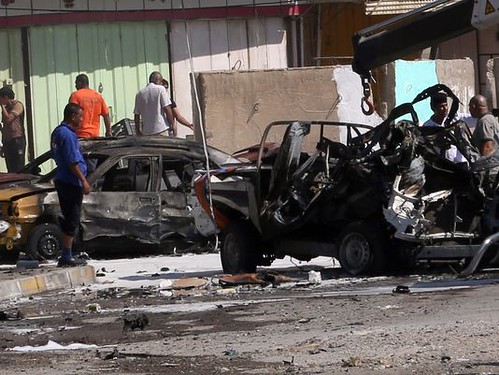
Damage from a string of bombs in post-occupation Iraq. The US invasion and occupation destroyed this Middle Eastern state., a photo by Pan-African News Wire File Photos on Flickr.
Wave of car bombs across Baghdad kills 51
8:23 a.m. EDT September 30, 2013
BAGHDAD (AP) — A wave of car bombs struck mainly in Shiite neighborhoods of Baghdad on Monday morning, killing at least 51 people and wounding dozens more, officials said.
The country's Interior Ministry blamed al-Qaeda-linked insurgents, saying they are exploiting the political infighting and security shortcomings to stage attacks.
The deadliest of the day's bombings was in the eastern Sadr City district, where a parked car bomb tore through a small vegetable market and its parking lot, killing seven people and wounding 16, a police officer said.
That was followed by a total of 10 parked car bombs, which went off in quick sequence in the Shiite neighborhoods of New Baghdad, Habibiya, Sabaa al-Bour, Kazimiyah, Shaab, Ur, Shula as well as the Sunni neighborhoods of Jamiaa and Ghazaliyah.
The 10 other explosions also struck at outdoor markets or parking lots, killing 44 people and wounding 139, according to other police officers. Medical officials confirmed the causality figures in Monday's attacks. All officials spoke on condition of anonymity because they were not authorized to talk to the media.
No group immediately claimed responsibility for the deadly wave, which bore the hallmarks of al-Qaeda's local branch in Iraq, known as the Islamic State of Iraq.
Iraqi security forces sealed off the sites of the attacks as fire fighters struggled to extinguish fires that broke out. Twisted wreckage of cars and remnants of the car bombs littered the pavement.
"Our war with terrorism goes on," Interior Ministry spokesman Saad Maan told The Associated Press. "Part of the problem is the political infighting and regional conflicts ... There are shortcomings and we need to develop our capabilities mainly in the intelligence-gathering efforts."
Iraqi militants often target crowded places such as markets, cafes and mosques, seeking to inflict huge numbers of casualties.
Monday's attacks were the most widespread and deadly since the Sept. 21 suicide bombings that struck a cluster of funeral tents packed with mourning families in Sadr City, killing at least 104 people.
On Sunday, a series of bombings in different parts of Iraq — including two suicide bombings in the country's relatively peaceful northern Kurdish region — killed 46.
Violence in Iraq surged after government troops moved against a protest camp of Sunni demonstrators in April, triggering deadly clashes nationwide. Although overall death tolls are still lower than at the height of the conflict, the cycle of violence is reminiscent to the one that brought Iraq to the brink of civil war in 2006-2007.
More than 4,500 people have been killed since April.
Al-Qaeda is believed to be trying to build on the Sunni minority's discontent toward what they consider to be second-class treatment by Iraq's Shiite-led government and on the infighting between political groups, to ignite a sectarian warfare.
___
Associated Press writer Qassim Abdul-Zahra contributed to this report from Baghdad.
No comments:
Post a Comment